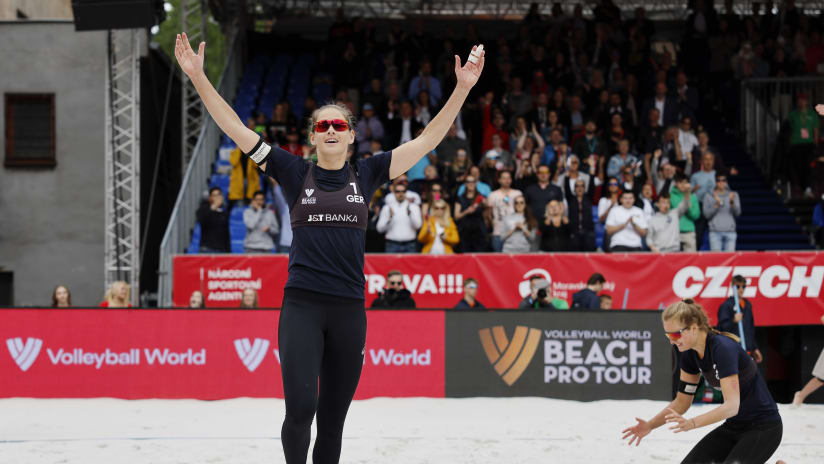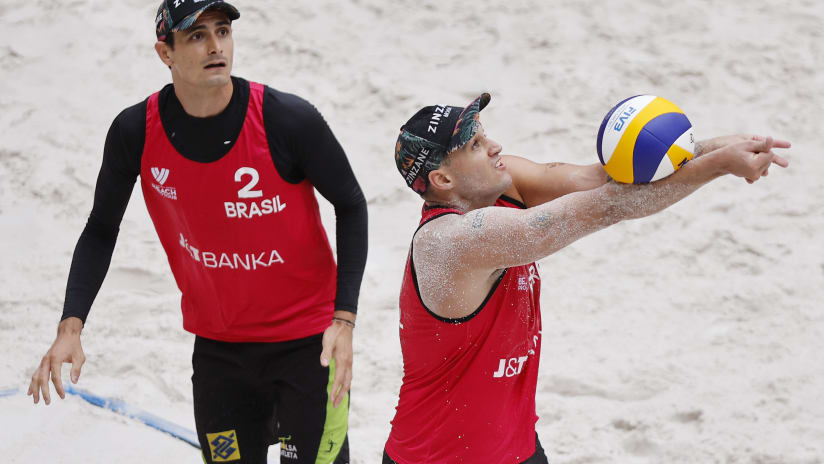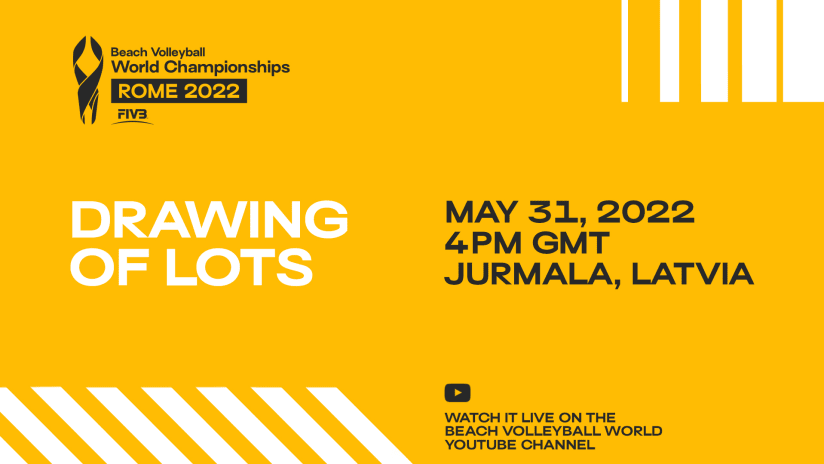Rewind the tape. Back it up a little more than 20 years. It’s 2001, and Aleksandrs Samoilovs and Martins Plavins are 17 years old. Nobody outside of Latvia has heard of the two teenagers, who are standing in the locker room with their indoor teammates.
Jurmala, Latvia
Latvia's rich history in beach volleyball continues growing
Latvia is hosting its first Volleyball World event with this week's Elite16 in Jurmala
Pubblicato 08:57, 31 mag 2022
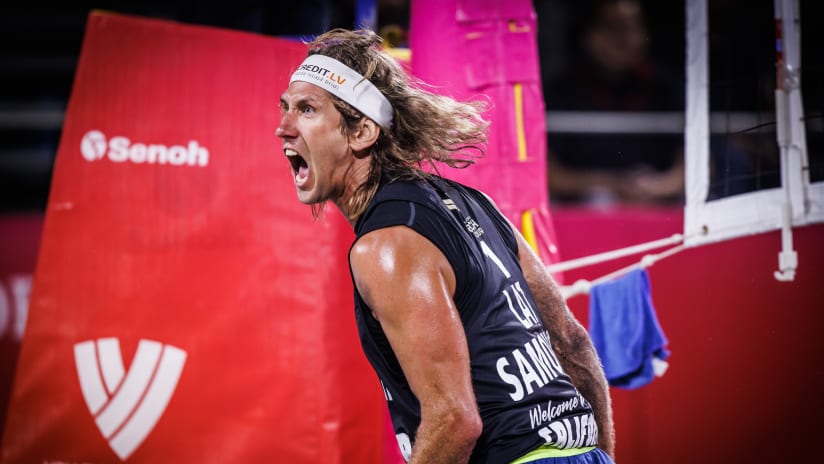
Latvian champ Aleksandrs 'Lion King' Samoilovs
Plavins commands the room. He has a declaration to make.
“We will qualify for Beijing,” the libero tells the room.
“There was silence and then everybody started to laugh,” Samoilovs recalls, now laughing himself. “Nobody had qualified for main draw, what does he mean, Olympics? But my father really believed, even me and Plavins, we said the Olympics sounds like something from a different world, like Elon Musk talking about Mars.”
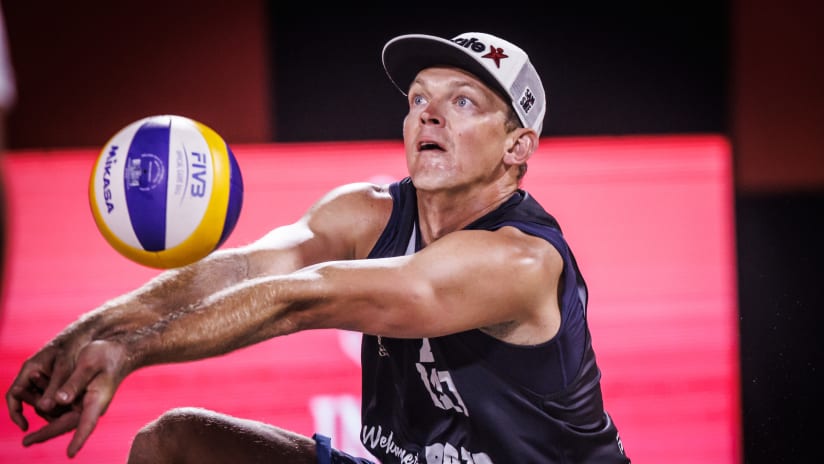
Janis Smedins digs in Rosarito
And if Musk is the leading innovator in this strange new world of space navigation and self-driving cars, then Samoilovs, Plavins, and Janis Smedins are the trailblazers of Latvian beach volleyball, a phrase of three words that, prior to 2008, would have been the most comical of oxymorons. Which was why Samoilovs and Plavins were laughed out of their own locker room.
Until they made history.
“They are like the holy trio,” Tina Graudina says now. “They made beach volleyball public.”
So public that it would now be far stranger to experience an Olympic Games without a Latvian team than it would be to see Samoilovs and Smedins, or Plavins, or Edgars Tocs, or, Graudina and Anastasija Kravcenoka not making a run deep into the medal rounds, as Tocs and Plavins and Graudina and Kravcenoka did in Tokyo.
Despite the mocking in the locker room that day in 2001, Samoilovs and Plavins would qualify for the 2008 Olympic Games in Beijing. And they wouldn’t simply fade on the biggest stage as an underdog darling from a country with summer for only three months out of the year. They’d engineer what is still considered the biggest upset in Olympic beach volleyball history, stunning top-seeded Phil Dalhausser and Todd Rogers, 21-19, 21-18, who would go on to win the gold medal. The Latvia media ate it up, putting Samoilovs and his flowing mane of blond hair on the cover of every newspaper and magazine, properly introducing the world to the man who would forever be known as the Latvian Lion King.
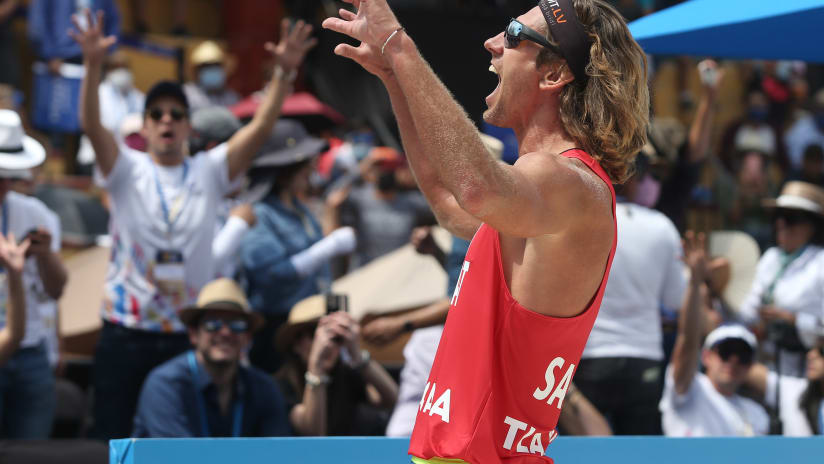
Samoilovs' trademark roar
“All of the media in Latvia was writing ‘Lion King, Lion King, Lion King roaring in Beijing!’” Samoilovs said. “Our biggest sports magazine in Latvia put me on the first page because it was the opening match of the Beijing Olympics and it was also the opening sport for Latvia so everybody was watching. They put ‘Lion King Roaring in Beijing’ on the first page.”
It was no fluke, either. One landmark milestone led to another. In 2012, Smedins and Plavins would win bronze in the London Olympics, the first medal in Latvian beach volleyball history. And then the boom, as Graudina says, began.
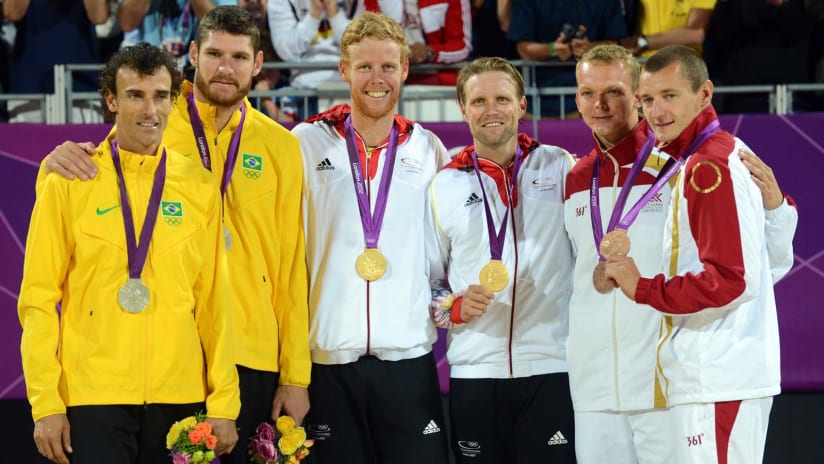
The men's podium at London 2012 featuring bronze medallists Janis Smedins and Martins Plavins of Latvia
“We only get two or three medals in general, so every single one of those medals is celebrated as the best thing ever,” said Graudina, a 24-year-old from Riga who is on the heels of a second straight NCAA Championship at the University of Southern California. “I remember watching the game for the bronze medal, and I even get goosebumps right now remembering that moment. After that medal, that’s when the boom started, that’s when I started practicing.”
It wouldn’t be until 2018 that Graudina would begin making her presence felt on the World Tour. In the six years between the London Games and her and Kravcenoka’s debut, Samoilovs and Smedins would become the first Latvian team to be ranked No. 1 in the world. They’d qualify for another Olympic Games, in 2016, entering as the top seed. So accustomed had Latvia become to success in the sport that it became strange when Samoilovs and Smedins or Plavins and Tocs didn’t win a tournament.
“We got used to them winning tournaments all the time,” Graudina said.
Soon, Graudina and Kravcenoka would aid in that effort. In 2019, they’d win their first event, and not just any event, but arguably the most important tournament of the season: The Olympic Qualifying Tournament in Haiyang, China. In victory, they sealed up a berth into the 2021 Tokyo Olympic Games, setting yet another milestone for Latvia: Graudina and Kravcenoka became the first women’s team to qualify for an Olympics.
“Looking back now, it feels like that’s such a big thing but in the moment, we didn’t realize it that much,” she said. “We definitely are currently the only women’s beach volleyball team in Latvia, and on the one hand, it feels nice to be the only team, because you get all the attention and recognition and everyone likes you because there’s nothing else to choose from, but on the other hand, the competition that comes from having other strong players within your country is so good for our development as players. Sponsors don’t have to choose between women’s teams, they choose us, because we are the only ones. We’re starting to become role models.”
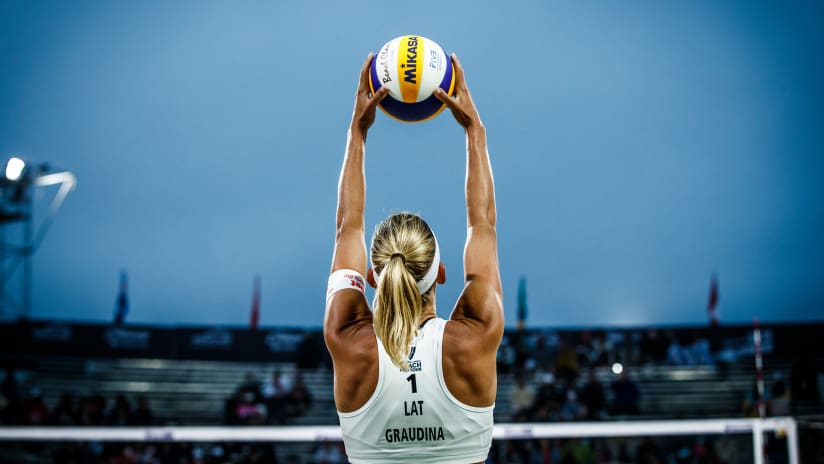
Tina Graudina prepares to serve
Now it has become impossible to ignore the impact of Samoilovs, Smedins, Plavins, Graudina, and Kravcenoka. Because of those five, along with Edgars Tocs, Latvia’s roster of players is deepening, as its tradition and history in the sport. This week, it will host the first Volleyball World event in the country’s history with an Elite16 in Jurmala.
Samoilovs and Smedins will begin in the main draw, while Tocs and 17-year-old Kristians Fokerots and Ardis Bedtritis and Arturs Rinkevics will begin in the qualifier.
For the women, Graudina and Kravcenoka are seeded No. 1 in the main draw, while Marta Ozolina and Luize Skrastina have received a wild card as No. 12. In the qualifier is Varvara Brailko and Deniela Konstantinova.
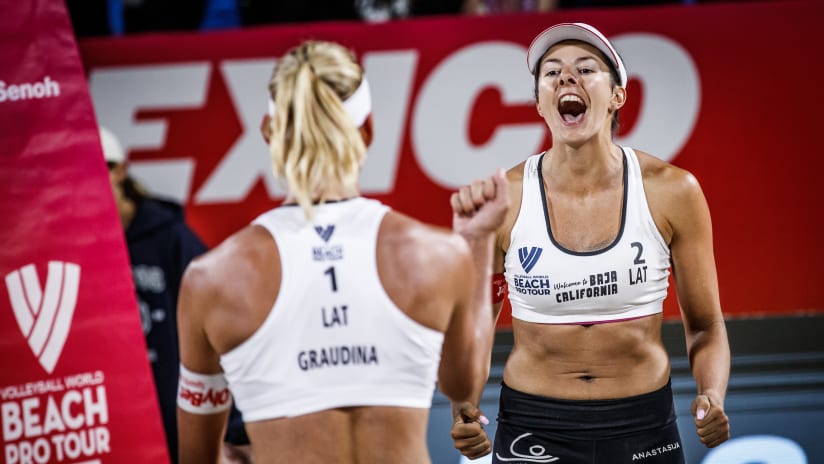
Tina Graudina and Anastasija Kravcenoka celebrate a point at the Elite16 event in Rosarito
No longer will Latvians snicker when a pair of these new teams and players sets an Olympic Games as their goal. In fact, that’s just become quite the norm.
“That’s one of the things I really like about playing beach volleyball: It’s a performance, you’re there to entertain and to play but you’re there to inspire and to make people want to have the same skills as you,” Graudina said. “To inspire is definitely one of the things that makes me love the sport and this is one of the ways I can do that.”


